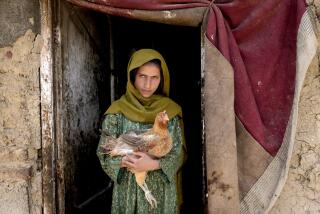Red Cross Reminds Iraq to Take Care of POWs
- Share via
GENEVA — The International Committee of the Red Cross is quietly reminding the Iraqi government of its obligation to abide by humanitarian law in its treatment of war prisoners.
At the same time, it voiced public concern Tuesday on the fate of civilian populations in Iraq and Kuwait after six days of intensive air raids by allies in the Gulf War.
The 128-year-old agency monitors compliance with the four Geneva Conventions of 1949, setting strict principles of behavior during war, but has no way of enforcing them.
Twice winner of the Nobel Peace Prize, it relies mostly on moral pressure and its long-established reputation of evenhandedness. It has alleviated the sufferings of millions on both sides in two world wars and hundreds of conflicts.
By dealing on an equal footing with Iraq’s “human shield” threat and the need to protect that country’s civilian population, it is promoting its traditional image of impartiality.
“We seek to bring relief to both sides in any conflict and to do so we must remain totally independent and impartial,” said Paul-Henri Morard, head of the Red Cross’ press division.
Iraq said Monday that it would use allied pilots captured in the Gulf War as human shields in likely military and economic targets, a threat that triggered a furor across the world.
The Red Cross said this would be a clear violation of the Third Geneva Convention, which states that POWs must be interned in special facilities far removed from combat zones.
The Red Cross’ seven delegates in Baghdad are seeking assurances from Iraqi authorities that the captured pilots will be treated in accordance to the Geneva Conventions, which Iraq signed in 1956.
As is standard Red Cross practice, it stopped short of condemning Iraq on the grounds that its delegates had no confirmation Baghdad had gone ahead with the threat.
To drive home the point and preserve its standing in Iraq, where its delegates established a fluid relationship with local authorities during the eight-year war with Iran, the Red Cross said its main concern was the fate of civilians.
“One can easily imagine that in some parts of Iraq which have been submitted to intense bombing for the past six days civilians are in need of help,” said spokeswoman Francoise Derron. “To us, this is a major concern.”
But she said the relief body had no clear picture yet on casualties.
More to Read
Sign up for Essential California
The most important California stories and recommendations in your inbox every morning.
You may occasionally receive promotional content from the Los Angeles Times.













